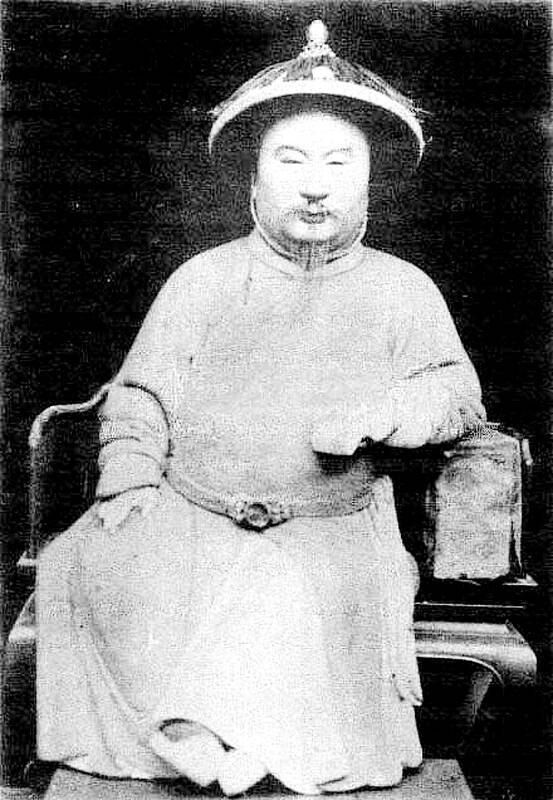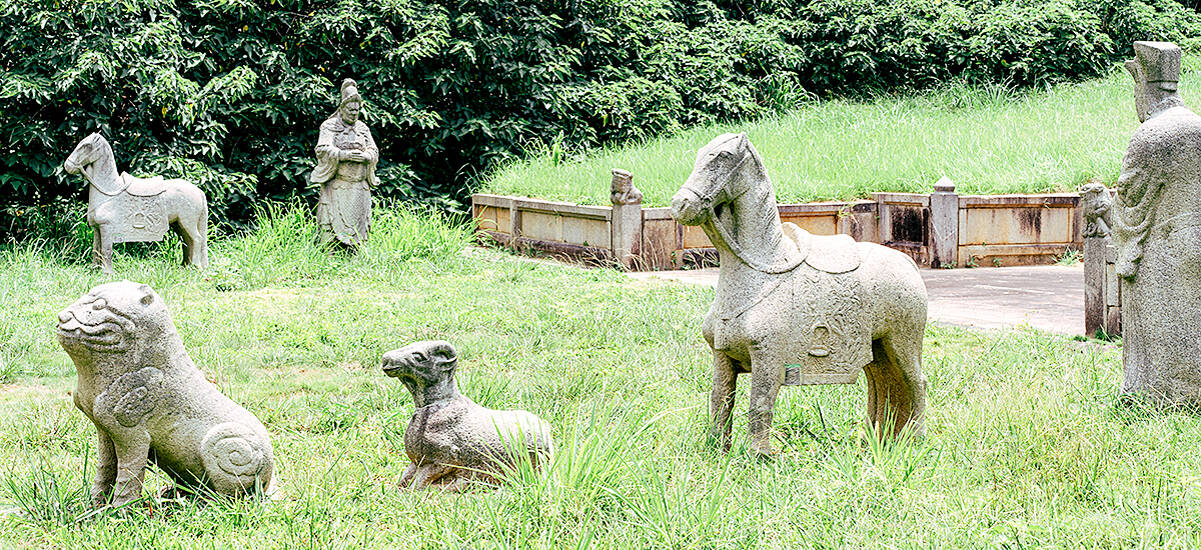May 13 to May 19
While Taiwanese were eligible to take the Qing Dynasty imperial exams starting from 1686, it took more than a century for a locally-registered scholar to pass the highest levels and become a jinshi (進士).
In 1823, Hsinchu City resident Cheng Yung-hsi (鄭用錫) traveled to Beijing and accomplished the feat, returning home in great glory. There were technically three Taiwan residents who did it before Cheng, but two were born in China and remained registered in their birthplaces, while historians generally discount the third as he changed his residency back to Fujian Province right after the exams.

Photo courtesy of Wikimedia Commons
Aside from spending three years in Beijing as a court official, Cheng preferred to stay in his hometown. A prolific essayist, poet and historian, one of Cheng’s more notable works is Persuasion of Peace (勸和論), which urged warring factions claiming ancestry from different parts of China to stop their constant armed conflicts. A noted philanthropist, Cheng promoted education and contributed to several public projects, including the upgrading of Hsinchu’s earth walls to stone in 1829.
Several historical relics related to Cheng remain, including his impressive Qing official-style grave site in Hsinchu’s East District (東區), guarded by twin stone guards, horses, goats and tigers. Last Friday, a vandal allegedly hacked off and stole the head of one of the goats.
Interestingly, this is not the first time it has happened. A China Times (中國時報) report from 1994 shows that the long-neglected site was in disarray with one stone tiger and the heads of the goats missing. Cheng’s descendants told the paper that local farmers probably did it out of superstition that the stone goats would trample on their crops.

Photo courtesy of Wikimedia Commons
PROMISING ACADEMIC
Cheng was born in 1788 in Miaoli’s Houlong Township, but his family moved to Hsinchu when he was eight years old. According to his biography by Cheng Fan-pai (鄭藩派), the family originated in Fujian Province’s Zhangzhou (漳州), relocating to Kinmen in the late 1600s and then to Taiwan in two waves during the mid-1700s. Cheng Fan-pai appears to be part of the family that remained in Kinmen.
Cheng Yung-hsi’s father Cheng Chung-ho (鄭崇和) was part of the second migration, arriving with several relatives in 1774 at the age of 18. Cheng Yung-hsi wrote that his father wanted to start a new life after failing the imperial exams several times and a famine ravaged Kinmen. Cheng Chung-ho opened a successful private school in Hsinchu and was also involved in other businesses, and by the early 1800s he had become a respected leader in the city.

Photo courtesy of Hsinchu City Government
Cheng Yung-hsi was academically inclined from a young age, and reportedly spent much of his youth buried in books. After passing county examinations at the age of 23, the family elders encouraged him to continue studying and aim for higher-level exams, vowing to support him in any way they could. Cheng failed his first stab at the provincial exams held in Fuzhou in 1818, but succeeded two years later, earning the title of juren (舉人).
Next were the national exams in Beijing. In 1823, Cheng finished 41th in the preliminary exams and 109th in the finals, successfully becoming a jinshi. He then began his teaching career, taking over in 1829 as headmaster of the Mingzhi Academy (明志書院), northern Taiwan’s first academy.
Cheng also helped construct the Hsinchu Confucius Temple (completed in 1824) and served on its board of directors.
PUBLIC AFFAIRS
Cheng served as an official in Beijing from 1834 to 1837. According to his poems, he could not get used to the conniving bureaucratic environment at court and cared little for the decadent lifestyle. He would rather be care-free and happy in his homeland, tending to his aging mother and helping with local affairs.
He built his residence, Jinshidi (進士第), soon after returning and resumed teaching at the Mingzhi Academy. Cheng spent most of his effort promoting education in Hsinchu, but he was also in active in activities involving his ancestral homeland, such as donating funds to renovate the Lukang Kinmen Hall (鹿港金門館) in Changhua County.
Cheng was rewarded by the Qing court several times for helping the army deal with unrest. He was greatly bothered that local factions, particularly those with ancestry from Fujian Province’s Quanzhou and Zhangzhou prefectures, could never get along and frequently engaged in open armed conflict. Clashes took place in different parts of northern Taiwan throughout the 1850s, with a particularly serious incident taking place in 1853 in today’s Wanhua District (萬華).
This event saw Quanzhou and Tongan (同安, technically in Quanzhou but speaking a different dialect) groups clash over rights to the port in Taipei’s Wanhua District (萬華). The Tongan faction was routed and their buildings torched, and the survivors fled north and established today’s Dadaocheng and Xiahai City God Temple. Dadaocheng eventually superseded Wanhua in prosperity.
PLEA FOR PEACE
Cheng was alarmed that even Quanzhou people were now fighting each other, wrote his plea for peace the following year, warning that continuing on this path will only lead to mutual destruction.
“Zixia (子夏) once said, ‘all men within four seas are brothers,’ much less those who live in the same neighborhood,” he wrote. “The ancient sages told us that those who share a home should support each other. How has the division between us become so extreme?”
“We all immigrated from China to Taiwan, therefore now we’re all Taiwanese ... ruled by the same Taiwan prefectural government. Isn’t it very strange that we insist on dividing ourselves into opposite groups?”
Finally, he writes that if people can settle their differences and care for both those who are similar and different, “in a few years, Taiwan will become a paradise on earth. Wouldn’t that be wonderful?”
Cheng died in 1858, and his body was moved to its current location in 1869. The grave was already in bad shape when city officials visited it in 1984, noting that most of the statues were barely visible in the overgrown grass.
The goat heads were already gone at that point. The 1994 report stated that the government would not replace the heads, and it’s unclear when they were restored.
Taiwan in Time, a column about Taiwan’s history that is published every Sunday, spotlights important or interesting events around the nation that either have anniversaries this week or are tied to current events.

This year will go down in the history books. Taiwan faces enormous turmoil and uncertainty in the coming months. Which political parties are in a good position to handle big changes? All of the main parties are beset with challenges. Taking stock, this column examined the Taiwan People’s Party (TPP) (“Huang Kuo-chang’s choking the life out of the TPP,” May 28, page 12), the Democratic Progressive Party (DPP) (“Challenges amid choppy waters for the DPP,” June 14, page 12) and the Chinese Nationalist Party (KMT) (“KMT struggles to seize opportunities as ‘interesting times’ loom,” June 20, page 11). Times like these can

June 23 to June 29 After capturing the walled city of Hsinchu on June 22, 1895, the Japanese hoped to quickly push south and seize control of Taiwan’s entire west coast — but their advance was stalled for more than a month. Not only did local Hakka fighters continue to cause them headaches, resistance forces even attempted to retake the city three times. “We had planned to occupy Anping (Tainan) and Takao (Kaohsiung) as soon as possible, but ever since we took Hsinchu, nearby bandits proclaiming to be ‘righteous people’ (義民) have been destroying train tracks and electrical cables, and gathering in villages

Dr. Y. Tony Yang, Associate Dean of Health Policy and Population Science at George Washington University, argued last week in a piece for the Taipei Times about former president Ma Ying-jeou (馬英九) leading a student delegation to the People’s Republic of China (PRC) that, “The real question is not whether Ma’s visit helps or hurts Taiwan — it is why Taiwan lacks a sophisticated, multi-track approach to one of the most complex geopolitical relationships in the world” (“Ma’s Visit, DPP’s Blind Spot,” June 18, page 8). Yang contends that the Democratic Progressive Party (DPP) has a blind spot: “By treating any

Swooping low over the banks of a Nile River tributary, an aid flight run by retired American military officers released a stream of food-stuffed sacks over a town emptied by fighting in South Sudan, a country wracked by conflict. Last week’s air drop was the latest in a controversial development — private contracting firms led by former US intelligence officers and military veterans delivering aid to some of the world’s deadliest conflict zones, in operations organized with governments that are combatants in the conflicts. The moves are roiling the global aid community, which warns of a more militarized, politicized and profit-seeking trend